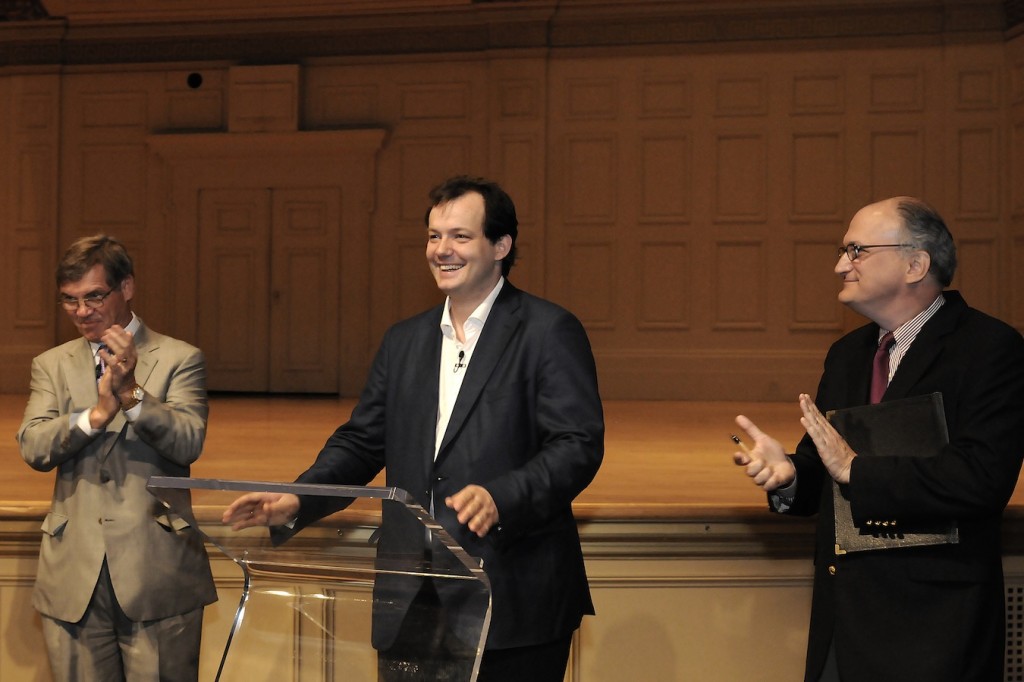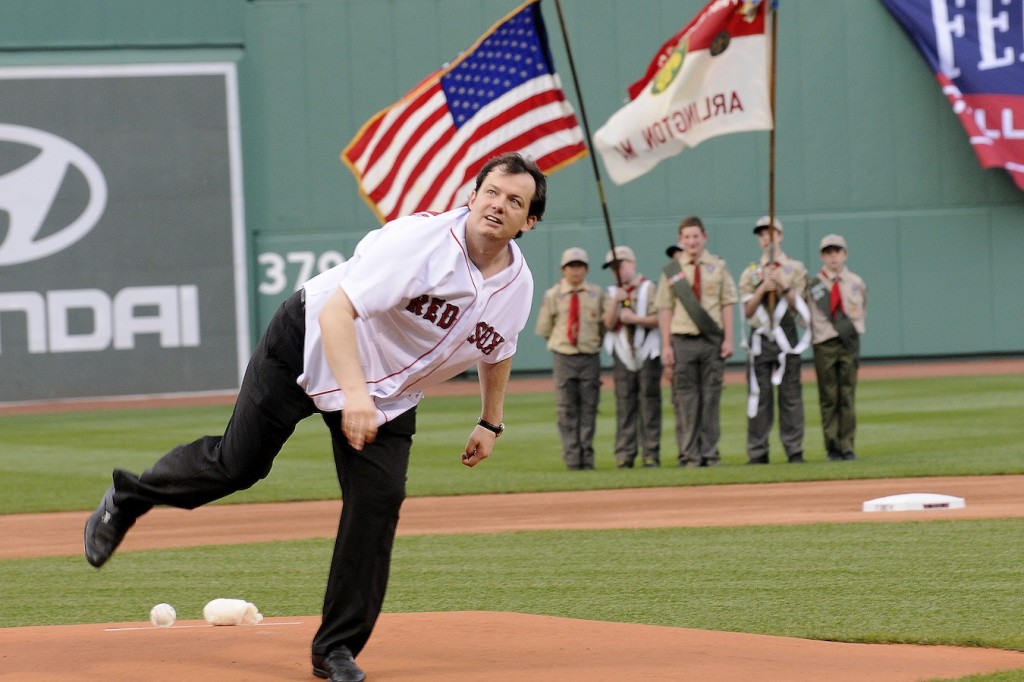Mr. Nelsons comes to Boston

Andris Nelsons, newly appointed Boston Symphony Orchestra music director, addresses a crowd Tuesday morning at Symphony Hall after signing his contract. Left is Ted Kelly, BSO chairman, and right, Mark Volpe, BSO managing director. Photo: Stu Rosner
For Andris Nelsons, the Boston Symphony Orchestra is like a Ferrari.
“When you have a great car, you want people to see the car,” he told the audience in Symphony Hall Tuesday morning.
In his first visit to the city since being named 15th music director of the Boston Symphony Orchestra last month, Nelsons had much to say about his new post. Wearing an open-collar shirt and dark blue sport jacket, he seemed at ease as he talked about his plans for the BSO. The crowd of trustees, board members, press and the city’s music lovers packed into the concert hall, where he received a warm and enthusiastic welcome.
For the 34 year-old conductor, his new job is a dream come true. “I’m extremely fortunate and honored for such a great opportunity to conduct the Boston Symphony Orchestra. [It has] such a great tradition, in such a great city, with such great people,” Nelsons said. “I always knew the orchestra growing up in Latvia from recordings and from reading about it. I never imagined I’d get a chance like this.”
News this spring of Nelsons’s appointment came as a surprise to some observers since his was not among the more prominent names to surface in the rumor mill during the long search for a music director after the former conductor, James Levine, officially stepped down in 2011 due to medical reasons.
He is the third youngest conductor to hold the post in the orchestra’s history. But despite his youth, he has already logged podium time with some of Europe’s best ensembles, including the Berlin Philharmonic, the Royal Concertgebouw, and Bavarian Radio Symphony Orchestra. He has also conducted at the Royal Opera House in Covent Garden, the Metropolitan Opera, Vienna State Opera, and the Bayreuth Festival.
His debut with the BSO came by accident in March 2011, when he stepped in for an ailing James Levine to conduct Mahler’s Ninth Symphony at Carnegie Hall. Since then, he has since led the orchestra in Tanglewood performances of Ravel’s La Valse, Stravinsky’s Symphony of Psalms, and Brahms’s Second Symphony. This past January, he made his Symphony Hall debut when he conducted Shostakovich’s Violin Concerto No. 1, with Baiba Skride, and Tchaikovsky’s Symphony No. 5.
Besides his youth and vigor, one of the things that drew the search committee to Nelsons was the conductor’s chemistry with the musicians playing under his baton, said Mark Volpe, BSO Managing Director. “We saw you with the Royal Concertgebouw Orchestra, and it was clear you had a relationship with the players,” he told Nelsons and the audience Tuesday afternoon.
Nelsons’ visit was celebrated all around the city. A large photo of the conductor hung from lamp posts and billboards outside Symphony Hall. The city declared Tuesday “Andris Nelsons Day” in a ceremony at Faneuil Hall, where Nelsons directed BSO brass in a fanfare. The conductor even threw out the ceremonial first pitch at Tuesday night’s Red Sox game.
The main event of his whirlwind day, though, took place in the morning in Symphony Hall, as the audience stood to witness Nelsons sign his contract with a pen made from the same wood used in the construction of the historic concert hall’s stage floor.
Beginning with the 2014-2015 season, his five-year contract stipulates eight to ten weeks of concert appearances in his first year. He will lead twelve weeks of concerts in each of the remaining years, according to a BSO press release.
Though he won’t officially hold the title of music director until then (his title for this coming season will be music director designate), Nelsons will get a head start this summer, when he will lead the BSO and Tanglewood Festival Chorus July 27 in Verdi’s Requiem at the Tanglewood Music Festival. In his first Symphony Hall appearance of the 2013 season, he will conduct the BSO in Wagner’s Siegfried Idyll, Brahms’s Symphony No. 3, and Mozart’s Piano Concerto No. 25, with pianist Paul Lewis, (October 17-19). Nelsons will return to the podium next spring for a performance of Strauss’s Salome (March 6, 2014).
Sitting down with Volpe on cushioned chairs placed in front of the stage, Nelsons told the audience that he plans to emphasize repertoire not featured in BSO programs under his predecessor. For starters, he said he will program more works by Bruckner and Shostakovich, two composers Levine ignored. In addition, he said he would like to bring new repertoire to Symphony Hall through commissions, exploration of contemporary works, and “strong pieces” by composers from Baltic and Slavic countries, even his native Latvia.
“I really think that music is food for our souls,” he said. “If music heals the soul, you need different medicines, different repertoire.”
When Volpe asked about his additional goals, Nelsons said that he plans to take the BSO on festival tours around Europe and North and South America. Sound and video recording projects with the orchestra are also on his wish list, he added.
“I have so many dreams,” he said. But most of all, “I want Boston to become a musical family [with] a strong relationship between the orchestra and the audience.”
The conductor went on to answer questions from members of the audience. He talked of his childhood fascination with conducting, his experiences growing up in Latvia, his plans to find a big apartment in Boston, and his family.
His wife, soprano Kristine Opolais, recently made her Metropolitan Opera debut in Puccini’s La Rondine. This summer, she will perform as a soloists in Verdi’s Requiem at Tanglewood, led by her husband.
The busy couple makes their home in Riga with their eighteen-month-old daughter Adriana.
“For a young conductor, how do you balance the study of repertoire with raising a young family,” Volpe asked Nelsons.
“You start with a big breakfast,” Nelsons answered.

BSO music director designate Andris Nelsons throws out the first pitch Tuesday night at the Boston Red Sox game at Fenway Park. Photo: Stu Rosner